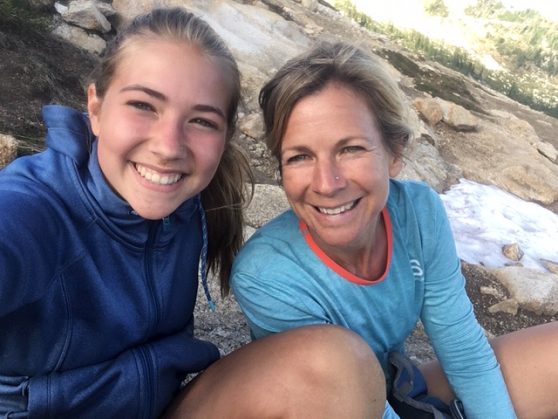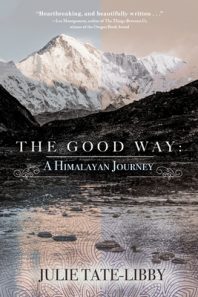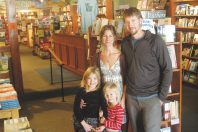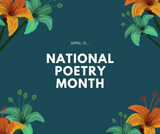
Annika Libby (l) and Julie Tate-Libby
 Growing up, I always assumed I would be just like my mother. I would travel to India… and yes, of course I would get my PhD. Why? Because my mom did. Now, at seventeen years old myself, I can only hope to follow in her footsteps. Not by getting a PhD in anthropology, or traveling to Nepal, but by finding my own path as she did twenty-five years ago. As it happens, my mother and I are very similar. I do want to go to Nepal, and I would love to further my education as far as a PhD, but most importantly–my mother and I both share a passion for mountains. It’s a faith in nature and the greater world that I have been raised with. And after reading The Good Way, not only do I know why, but I am able to understand just what this faith means.
Growing up, I always assumed I would be just like my mother. I would travel to India… and yes, of course I would get my PhD. Why? Because my mom did. Now, at seventeen years old myself, I can only hope to follow in her footsteps. Not by getting a PhD in anthropology, or traveling to Nepal, but by finding my own path as she did twenty-five years ago. As it happens, my mother and I are very similar. I do want to go to Nepal, and I would love to further my education as far as a PhD, but most importantly–my mother and I both share a passion for mountains. It’s a faith in nature and the greater world that I have been raised with. And after reading The Good Way, not only do I know why, but I am able to understand just what this faith means.
The Good Way, a Himalayan Journey (published by Koehler Books, released November 25, 2019) is my mother’s account of her travels to India and Nepal—first as a 17-year-old missionary, and later, as an anthropology student, conducting fieldwork. What I love about my mother’s book is seeing the world through her eyes at 17 and 19 years old. I can relate to the main character, her thoughts and ruminations are similar to my own. As I read about her anorexia and chafing under Christianity as a young girl, I could hear her voice, as familiar as if she were talking to me. Reading about her experiences made me wonder at her bravery and charisma as a girl my age.
I was excited to interview her for this book, because although her story was profoundly familiar, I had so many questions about who she was at my age. Below is the conversation we had after I finished the book. We alternately laughed and cried during this interview. Ultimately, I learned why she wrote the book, how her travels affected her, and what she wants to leave behind.
Annika Libby: What do you think is the most important chapter of the book? Why?
Julie Tate-Libby: I actually think the first chapter is most important because it frames the rest of the story. It’s not actually my favorite chapter. The rest of the book is about Nepal, and this chapter is about the time I spent in India when I was 17, but I think it shows where I was at during that time. I was still very much a part of the church culture, so I think that kind of sets up the rest of the story.
AL: What does “the good way” mean? Why did you choose this title?
JTL: I had a lot of anxiety and I was feeling very conflicted about going on a mission’s trip to India even before I went. I was reading through the Bible and I came upon this verse, Jeramiah 6:16. It really has nothing to do with personal exploration or travel, but I found it and I loved the way the words sounded. It was like a poem. It says, “Ask for the ancient paths, ask where the good way is, and walk in it, and you will find rest for your souls.” I thought that was reassuring. So, I copied the verse down on the front-page inside my journal. It kind of became my reference point for the whole trip.
AL: You mentioned to me once that you read your journals from when you went to India at 17, and then your research notes from Nepal at 19. You said that at 17 you really weren’t thinking about much, whereas at 19 you were much more anthropological. How did that switch happen and why?
JTL: I’ve always kept a journal, but I think when I was in my teens, it was much more about self-exploration. I wrote down my deepest thoughts, who I had a crush on, and things like that. It was more like a conversation I was having with myself. But later at 19, I wrote down details and payed attention to what actually happened. So, when I started going back to write that chapter in India (which I wrote last), I had a hard time because the whole journal was filled with my thoughts and my anxieties about religion. I had no reference except my memory for the villagers or the places that we went. Reading my journals from Nepal were much more photographic and concrete.
AL: In your book, you travel to the Himalayas alone, but the main character rarely seems afraid. Weren’t you scared?
JTL: Weirdly, I think I would have a lot more fear now. I think I would be terrified! Young people have this mentality that they’ll live forever. They can’t really imagine anything happening to them, or that they could die, so I don’t think that back then, I had the same fear mechanisms as I do now. In the book, I was afraid a couple times, but the whole thing really felt like a grand adventure. I had no fear going into it. The problem lay more in that I was lonely a lot, and also a bit morbid at that stage in my life. I felt lonely and sad, and that was hard to cope with, not fear per se.
AL: Where were your parents when you went to Nepal? How was your relationship when you returned?
JTL: Well, being ten thousand miles away in 1996, there wasn’t much opportunity to talk. I didn’t actually know how to email. Manny, the guy I lived with emailed for me. He would send a note to my parents once or twice throughout the whole time. I talked to them once on a satellite phone from Kathmandu for maybe 10 minutes. So yeah, I think that they were worried but they also kind of had to let it go.
AL: I already know this answer of course, but did you ever go back to Nepal after 1996?
JTL: Yes, your dad and I went back about three years later, and this time we trekked to Everest Base Camp. In the book my I really wanted to be a mountaineer and to continue to Everest Base Camp, so when we went back, we fulfilled that wish. It was a great trip, but I think I was disappointed in some ways because I wanted to recreate that sense of mysticism that I had when I was 19. But you know, you can’t really go back to the same place.
However, the following trip was what actually got me interested in tourism. From 1996 to 2001, there were a lot of changes… deforestation, new homestays, some flush toilets. After 2001 we had you girls, so then I didn’t go back to the Himalayas until I was 35. We went to the eastern Himalayas in China. And then as you know, three years ago I went to Ladakh, so I’ve been back a few times.
AL: Given your upbringing in Christianity, what is your personal view of spirituality now? How does this affect your relationship with your family?
JTL: I will always have a strong moral compass. I think I’ll always feel a deep sense of right and wrong. Even now, as an adult, when I feel like I’ve “sinned,” or haven’t lived up to my expectations or other people’s expectations, I feel a sense of shame because in Christianity you’re hardwired to admit your faults. But I think there’s something really beautiful about that because growing up in the Christian faith you’re trained to ask forgiveness from someone you’ve wronged. It’s nice because, in a way, you get to reset things with people. You keep your accounts short. So, forgiveness is a huge aspect of my life…and all those themes from Christianity: redemption, faith, hope, love.
However, with Christianity itself? I mean, I haven’t been in a church in 20 years. I’ve never looked back. I only had a hard time with it when you girls were young because I felt like I should be raising you in some kind of religion. I would have loved to have been fully Buddhist or something, but of course, I wasn’t—so I raised you with the values I wrote about at the end of the book. The “faith” of mountains, an awareness that we came from this planet and that we’re a part of everything.
AL: As you know, I’m planning to go to India myself this coming summer. As a mother, what would you want me to take away from my experience?
JTL: Well, for one thing I hope you don’t feel pressured to have a life-changing experience or anything. Of course, it’s so ironic that you’re going to India at 17 on a volunteering program exactly 25 years later from the year I went. And Mia’s going to Tanzania… It’s what I would have always wanted for both of you. But I guess what I’d like you to take away is a sense of the grand adventure of your life. All the traveling that I’ve done, particularly by myself has felt so spacious. The world is still a beautiful place. I know with all the politics and climate change and everything, I feel like you girls have grown up with a sense of loss, even before your time. I would hope that you would come away from your trip with a sense of the magic of being alive.
AL: What kind of audience do you think would most relate to this book?
JTL: Honestly, you might be able to answer that better. Of course, recovering Christians, young adults, people interested in travel, et cetera. The message of the story is about finding your own way, just as you and Mia will have to find your own paths. As a parent, I want nothing more for you than for you girls to hear your own voice at a young age. If you can learn to trust yourselves, and make your own decisions, and don’t look back. I won’t always be here…. (laughs, cries) … I don’t want you to worry about what I would have thought.
AL: What do you hope to achieve with this book? What would you hope to impart to young readers such as myself?
JTL: People always ask me why I wrote the book, and I think that’s kind of a hard question because why do you do anything? Why do people paint pictures or write songs? But if I could help young girls at your age, between 16 and 25, have a sense of their own resilience. Because that will carry them so far. If you can grab ahold of that, you’re going to have something to fall back on for the rest of your life. In Christianity, I was never allowed to hear that voice. It was always imposed on me, and that was why I struggled to find my own spirituality. I think now it’s even more important because there’s so many distractions. So much media. Maybe one of the things I would hope to achieve, would be if any young girl could turn her phone off in order to find that stillness within herself. Part of developing who you are and becoming a strong independent woman is being able to take that time out to hear yourself, even if it’s lonely.
AL: Okay, last question… Are you working on anything right now?
JTL: Yes, I’m working on another book, almost a sequel. It’s about three years ago when I taught that course in Ladakh. I’m writing about that trip through the lens of Ladakhi families, exploring cross cultural themes of marriage, kinship, and family. It’s wonderful to be writing again.
Julie Tate-Libby is the author of The Good Way: A Himalayan Journey. She is the former owner of Trail’s End Bookstore in Winthrop, WA. Annika Libby is a full-time student as well as a part-time bookseller at Trail’s End. You can read an interview with the family from 2011 in our archives here.




